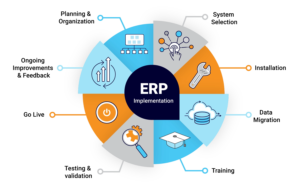Effective Enterprise Resource Planning (ERP) implementation support is the linchpin for organizations aiming to harness the full potential of their ERP systems. ERP implementation is a complex endeavor involving multiple stakeholders, intricate processes, and significant investments. As such, having robust support throughout the implementation journey is essential to ensure successful outcomes.
The role of ERP implementation support extends far beyond technical assistance. It encompasses a holistic approach that addresses various facets of the implementation process, including planning, execution, training, and post-implementation support. Here’s a breakdown of key elements that constitute effective ERP implementation support:

1.Comprehensive Planning:
A solid foundation is laid during the planning phase, where key objectives, timelines, resource allocations, and potential risks are identified and addressed. ERP implementation support involves collaborating closely with stakeholders to develop a detailed roadmap tailored to the organization’s unique needs and goals.
2.Expert Guidance:
Seasoned ERP consultants provide invaluable expertise and guidance throughout the implementation process. They offer insights gleaned from previous implementations, best practices, and industry standards, helping organizations navigate challenges and make informed decisions.
3.Customization and Configuration:
ERP systems must be customized and configured to align with the specific workflows and requirements of the organization. Implementation support teams work closely with stakeholders to tailor the ERP solution, ensuring it meets both current and future needs while maximizing efficiency and usability.
4.Change Management:
ERP implementation often entails significant organizational change, impacting workflows, roles, and responsibilities. Effective change management support helps mitigate resistance to change, fosters buy-in from employees, and ensures a smooth transition to the new system.
5.Training and Education:
Investing in comprehensive training programs is crucial to empower users with the knowledge and skills needed to effectively utilize the ERP system. Implementation support teams facilitate training sessions, develop user manuals, and provide ongoing support to ensure users feel confident and proficient in navigating the ERP platform.
6.Quality Assurance and Testing:
Rigorous testing is conducted throughout the implementation process to identify and address any issues or discrepancies. Implementation support teams oversee testing efforts, ensuring the ERP system functions as intended and meets performance benchmarks before going live.
7.Continuous Support and Optimization:
ERP implementation support doesn’t end with the go-live phase. Ongoing support is provided to address any post-implementation issues, optimize system performance, and facilitate continuous improvement initiatives.
In conclusion, effective ERP implementation support is a multifaceted endeavor that requires meticulous planning, expert guidance, and ongoing commitment. By investing in comprehensive support services, organizations can maximize the value of their ERP systems, drive operational excellence, and achieve their business objectives with confidence.